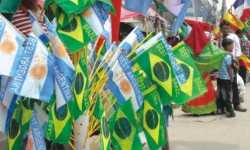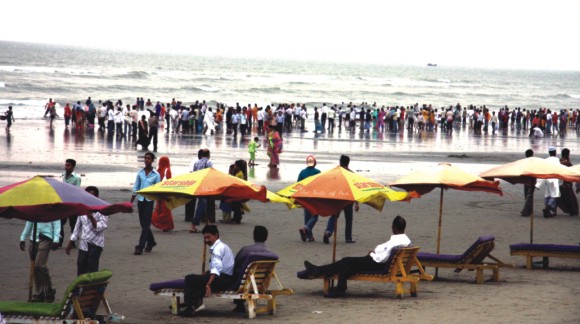Letters
A threat to maritime commerce
Piracy in Somalia has become the hot cake since December 5, 2010 as the modern day 'black beards' seized Bangladeshi ship 'M B Jahan Moni' containing 41 thousand metric tons of metal cargos travelling from Indonesia to Greece. The family members of the seized crew and the nation as a whole are waiting with anticipation and anxiety the fate of the Bangladeshi crew members. This is the first time a Bangladeshi ship has met such a fate.
The reasons piracy is thriving off the Somali coast include the state of anarchy in Somalia since the early 1990s. Civil war destroyed the government, and in 2006, Ethiopia invaded the country, with full support of the USA to prevent the rise of an Islamist government in Somalia. Also, as a result of the fall of the Somali government, foreign trawlers began to fish illegally in Somalia's seas, with an estimated $300 million of tuna, shrimp, and lobster being taken each year, depleting stocks previously available to local fishermen off the Somali coast thereby causing economic damage to the Somali fishing industry. Somali fishermen, with ready access to small-arms and portable rockets left as an aftermath of the civil war, took to the seas to make a living by attacking foreign fishing and cargo ships off their coast. This spontaneous privateer activity eventually turned into the highly organised and more heavily-armed pirate organisations.
From their viewpoint Somali pirates don't see themselves as the bad guys. As one of them remarked– “We don't consider ourselves sea bandits. We consider those as sea bandits who illegally fish in our seas and dump waste in our seas and carry weapons in our seas.”
Ultimately, according to my own view, though the emergence of piracy was to protect their own interest, piracy in the cost of Somalia is currently an international problem, as it has become a formidable threat for world trade and commerce and even the life of the crew seized by pirates. As Ethopia, backed by the USA is responsible for this international crisis, the world's sole superpower should primarily take the responsibility to sort out the problem they created in the first place.
Titas Mia
University of Dhaka
The Expression of Feelings
 During world cup football our eccentricity reached to a great extent. Supporters of each team turned out to be as aggressive as the players. Showy flags were omnipresent, dominating the skylines. Such flags were hoisted in order to depict staunch support for our favourite team participating in the tournament. It is like a trait passed on from one generation to the next. While the supporters bicker away - most of them don't even have a clue or care where these countries are located on the globe or what language their football idols speak. We enthusiastically exhibit our utmost support by hoisting our favourite teams' flags during the football world cup season.
During world cup football our eccentricity reached to a great extent. Supporters of each team turned out to be as aggressive as the players. Showy flags were omnipresent, dominating the skylines. Such flags were hoisted in order to depict staunch support for our favourite team participating in the tournament. It is like a trait passed on from one generation to the next. While the supporters bicker away - most of them don't even have a clue or care where these countries are located on the globe or what language their football idols speak. We enthusiastically exhibit our utmost support by hoisting our favourite teams' flags during the football world cup season.
But why don't we do the same during the Cricket world cup? There has been a comprehensive improvement in the recent performance of the Bangladesh Cricket team. The upcoming world cup, which will be held next year, could be a stage to onset a new tradition of hoisting our own national flag. Hoisting of flag ubiquitously does not have any relationship with the performance of the players. It is just a way to show our support and to inspire the tigers. Eventually, they might actually produce a scintillating performance in the world cup this time round.
Monjur Hasan Neesat
Cider International School
Chitagong
A Neglected Natural Wonder
Cox'sBazar is the town with the longest sea beach in the world, the tourist spot which provides 22 percent of our national income. Now that schools are closing for winter break, your children may want to take a vacation to see the beach. Take this opportunity to come and see the condition of this so-called beautiful beach. The sands are littered with dirt and debris and the water is dirty and smelly.
And if you want to see the town and take in some culture, it will cost you every ounce of your patience to do so. But we are Bengalis, if we can endure traffic jams, terrible load-shedding, dirt and human excrement by the side of the roads, and terribly unsafe roads, we are equal to anything. There are some Burmese markets, some hotels and nothing else too see in this small town. Once, we had a minister elected from our locality. Unfortunately, he wasn't born in our town, but in a village just outside. The fortunate villagers from his village received benefits such as better roads, better electricity supply etc, but our townspeople got nothing. Such is life. And the present government does not feel the need to do anything for this town because the townspeople support BNP. When BNP is in power, they do not feel the need to give this town any special benefits and develop it because they are confident that people here will vote for them regardless. So, if we get nothing, no development, no advancement, then why should we vote for Cox's Bazar?
I think we should stop. Its better for you to vote for Sylhet, the tea garden heaven. You can visit it. You will get natural beauty, clean, wide roads, electricity, lots of beautiful places like Jaflong, Madhabkunda, Srimongol and so on. Let Cox's Bazaar go to hell.
Nusrat Sharmin
Cox's Bazar

Photo: Star File
On the Edge: Unregistered Rohingyas
The incidents that take place along the Myanmar border often keeps us tense. There are huge numbers of unregistered Rohingyas living in the makeshift camps of Kutupalong and Taal located along the south-eastern Bangladesh border with Myanmar. The unregistered foreigners who cross the border fearing persecution from a brutal military regime in our neighbourng country live a very miserable life. Many of them end up in the camps where they live in deplorable conditions and that often means surviving without food for days.
They are also at the mercy of some unscrupulous natives and registered counterparts who often collude in physical attacks on unregistered refugees with backing from the law enforcement agencies. They are not allowed to work in the towns and earn the bare minimum for survival. So their only source of income is firewood that they collect from the nearby forests. They belong neither to Bangladesh nor to Myanmar. A bilateral talk between the two countries might have settled the issue but considering the xenophobic and oppressive mentality of the Myanmar regime, this might not be feasible either and the Rohingya crisis looks far from being solved.
Ahsan Uddin Tohel
SUST, Syhlet
Submission Guideline:
Letters to the Editor, Star Diary and Write to Mita, with the writer's name and address, should be within 200 words. All articles should be within 1,200 words. A cover letter is not necessary, but every write-up should include the writer's name, phone number and email address (if any). While The Star welcomes unsolicited articles and photographs, it cannot accept the responsibility of their loss or damage. The Star does not return unsolicited articles and photos. Response time for unsolicited write-ups ranges from three weeks to two months. All articles submitted are subject to editing for reasons of space and clarity.
All materials should be sent to: The Star magazine, 64-65, Kazi Nazrul Islam Avenue, Dhaka-1215, Fax: 880-2-8125155 or emailed to: <[email protected]>
It is recommended that those submitting work for the first time to The Star take a look at a sample copy beforehand. Our website is: http://www.thedailystar.net/magazine
Copyright (R) thedailystar.net 2010
